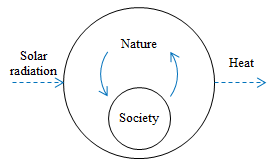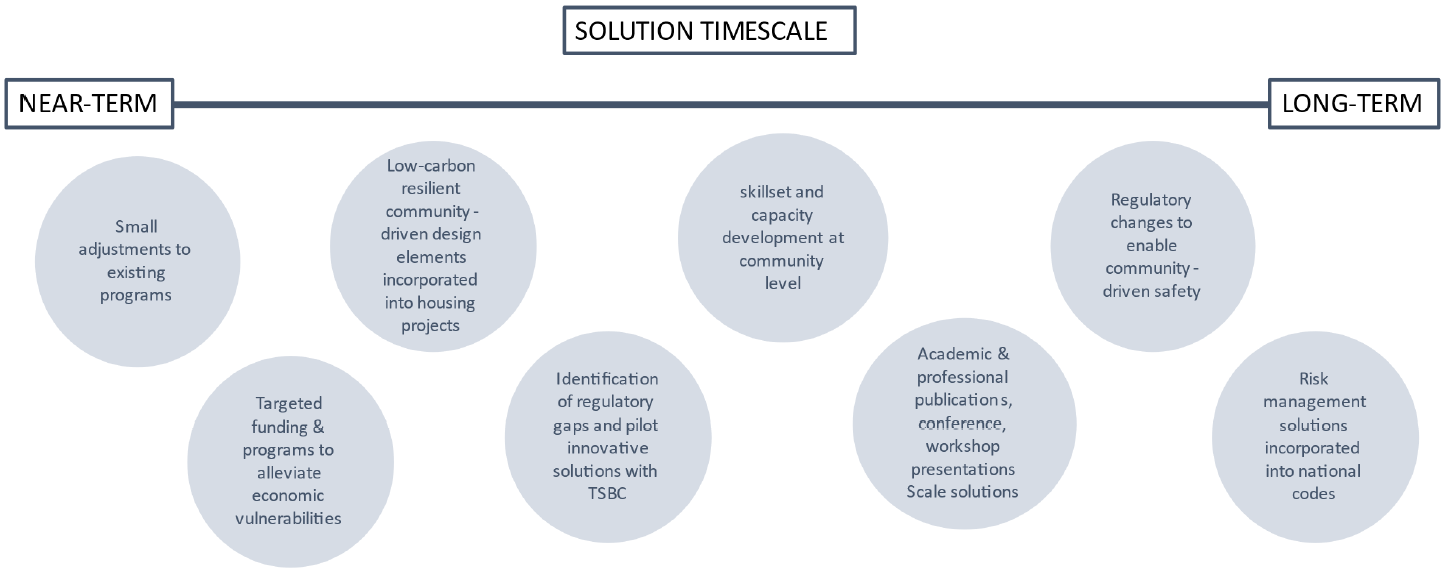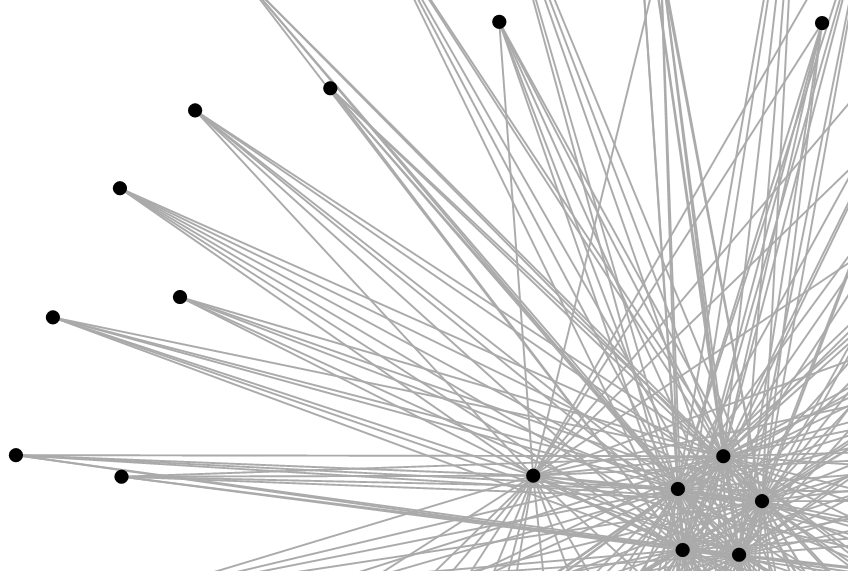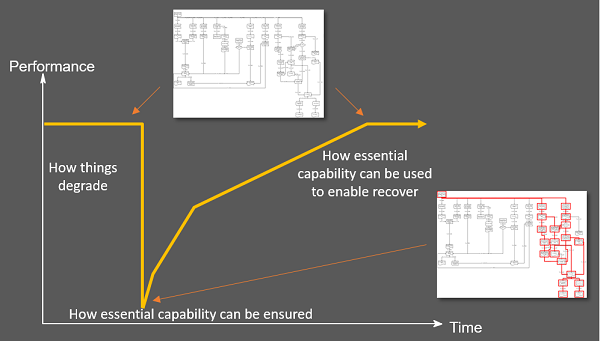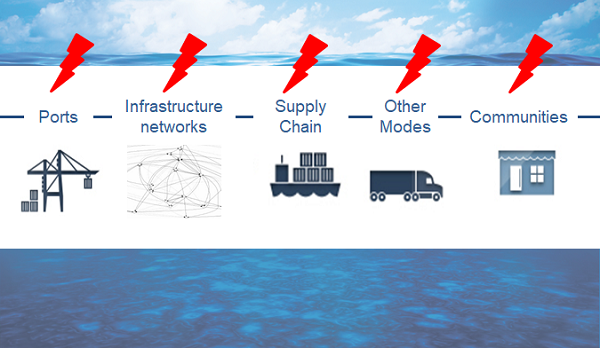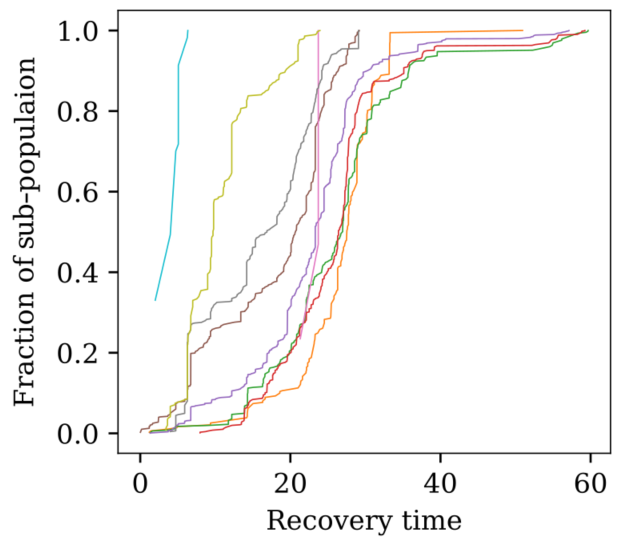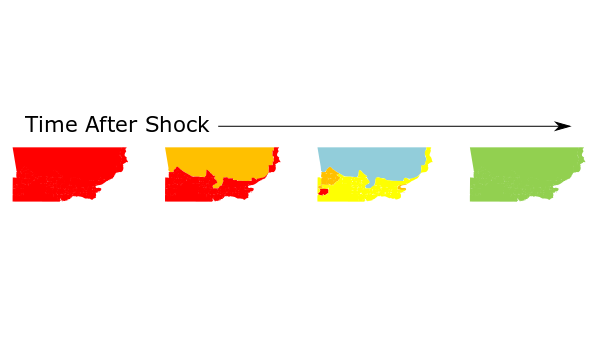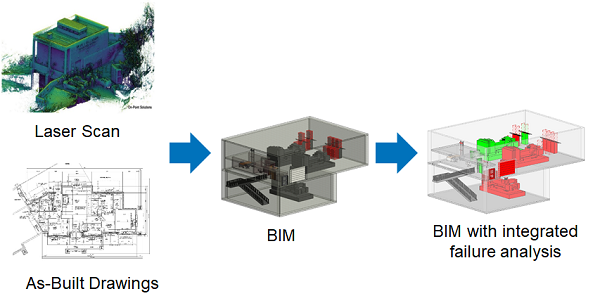Memberships
Research
Climate change mitigation and adaptation
Balancing value, sustainability and risk.
How do we need to change our buildings and cities to meet the challenge of climate change? How should we adapt? What emissions can we mitigate? As the IPCC recognizes, context specific approaches are required. This work looks at creating the tools and case studies to address these questions in different contexts – in different ecologies of interacting factors. How do we design and plan our buildings, infrastructure systems and cities to deliver value, manage our risk and reduce our impacts? This interdisciplinary research examines multiple objectives of multiple participants and stakeholders in the design and plans of engineered works and cities.
Recovery planning for resilience
Accelerating restoration of services after cascade failures.
Can our assets, infrastructure systems and cities recover following shocks? Can the recovery be socially-just? Research on this important topic integrates investigation on cascading consequences with cutting edge models of recovery. The result is combined models we can use to assess the chance of recovery with our Graph Model for Operational Resilience (source code).
Science of cities
Studying how cities change and can be changed.
Science of cities How can we make the invisible visible? Can we understand the complex dynamics of cities and their systems? This work examines how we can minimize and respond to unintended consequences by understanding cities from first principles.
Team
Dr. David N. Bristow
PhD
Assistant Professor, Group Leader
Andrew Deelstra
MASc
PhD Student
Vitali Terentjevs
MSc
Master's Student
Alison Goshulak
Lead Software Developer
Landon Marshall
Software Developer Intern
Finn Morin
Software Developer Intern
Josh Zakala
Research Assistant
Click here for alumni
Projects
Click here for past projects
Publications
See for full publication list and metrics.
Journal Papers
Deelstra, A., Bristow D.N., 2023. Methods for representing regional disaster recovery estimates: modeling approaches and assessment tools for improving emergency planning and preparedness. Natural Hazards. vol. 117(1), pages 779-802, https://link.springer.com/article/10.1007/s11069-023-05883-5.E53
Viseh, H., Bristow, D.N., 2023. Residential Flood Risk in Metro Vancouver due to Climate Change using Probability Boxes. The International Journal of River Basin Management, pp.1-18. https://doi.org/10.1080/15715124.2023.2200006.
Deelstra, A., Bristow D.N., 2023. Assessing the effectiveness of disaster risk reduction strategies on the regional recovery of critical infrastructure systems, Resilient Cities and Structures, Volume 2, Issue 3, Pages 41-52, https://doi.org/10.1016/j.rcns.2023.05.001.
Viseh, H. and Bristow, D.N., 2023. How climate change could affect different cities in Canada and what that means for the risks to the built-environment functions. Urban Climate, 51, p.101639.
Mohareb, E., Gillich, A., & Bristow, D. (2022). Participation in domestic energy retrofit programmes: key spatiotemporal drivers. Buildings and Cities, 3(1), pp. 356–375. DOI: https://doi.org/10.5334/bc.202
Almeida, L.S., Rodrigues, L., Goerlandt, F., Ancona-Segovia, J., Pelot, R., Bristow, D. and Chang, S., 2022. Datasets of disrupted transportation networks on Canada’s West Coast in a plausible M9. 0 Cascadia Subduction Zone earthquake scenario. Data in Brief, p.108762.
Bell, A.M. and Bristow, D.N., 2020. Modelling the marine transport resilience of Vancouver Island in a Cascadia subduction zone earthquake scenario. Sustainable and Resilient Infrastructure, pp.1-18.
Deelstra, A. and Bristow, D., 2020. Characterizing Uncertainty in City-Wide Disaster Recovery through Geospatial Multi-Lifeline Restoration Modeling of Earthquake Impact in the District of North Vancouver. International Journal of Disaster Risk Science, pp.1-14.
Atef, A., Bristow, D.N., 2020 Risk Assessment of Infrastructure Facilities Considering Spatial and Operational Interdependencies: Temporal Simulation Model. Structure and Infrastructure Engineering. (In Press).
Bristow, D., Mohareb, E., 2020. From the urban metabolism to the urban immune system. Journal of Industrial Ecology Special Issue on Industrial Ecology for Climate Change Adaptation and Resilience. Journal of Industrial Ecology Special Issue on Industrial Ecology for Climate Change Adaptation and Resilience, 24(2), pp.300-312.
Atef, A. and Bristow, D.N., 2019. Capturing the spatial and operational interdependencies among building systems using building information modelling. Structure and Infrastructure Engineering, 15(12), pp.1613-1629.
Bristow, D., 2019. How spatial and functional interactions between operations and infrastructure leads to resilient recovery. ASCE JIS, Vol. 25, Issue 2 (June 2019). [Full Paper Download]
Bristow, D.; Bristow, M., 2017. Retrofitting for resiliency and sustainability of households. Canadian Journal of Civil Engineering. [Full Paper Download]
Bristow, D.; Hay, A., 2017. Graph model for probabilistic resilience and recovery planning of multi-infrastructure systems. ASCE Journal of Infrastructure Systems. [Full Paper Download]
Bristow, D., 2015. Asset System of Systems Resilience Planning: The Toronto Case. Infrastructure Asset Management. DOI: 10.1680/iasma.14.00044. [Full Paper Download]
Bristow, D; Kennedy, C. Why Do Cities Grow? Insights from Non-equilibrium Thermodynamics at the Urban and Global Scales. Journal of Industrial Ecology. DOI: 10.1111/jiec.12239.
Bristow, D; Kennedy, C. Urban Metabolism and the energy stored in cities: Implications for resilience. Industrial Ecology (2013), DOI: 10.1111/jiec.12038.
Bristow, D; Kennedy, C. Maximizing the use of energy in cities using an open systems network approach. Ecological Modelling, DOI: 10.1016/j.ecolmodel.2012.11.005.
Bristow, D; Kennedy, C. The Energy for Growing and Maintaining Cities. AMBIO (2012), DOI: 10.1007/s13280-012-0350-x.
Bristow, D; Richman, R; Kirsh, A; Kennedy, C; Pressnail, K. Hour by Hour Analysis for Increased Accuracy of Greenhouse Gas Emissions for a Low-Energy Condominium Design. Industrial Ecology (2011), doi:10.1111/j.1530-9290.2011.00335.x.
Bristow, D; Kennedy, C. Potential of building-scale alternative energy to alleviate risk from the future price of energy. Energy Policy (2010), doi:10.1016/j.enpol.2009.11.067.
Kikuchi, E; Bristow, D; Kennedy, C. Evaluation of region-specific residential energy systems for GHG reductions: Case studies in Canadian cities. Energy Policy (2009), doi:10.1016/j.enpol.2008.11.004.
Invited Oral Presentations
Bristow, D., 2023. Climate Risks: Environment, regulations, and community. FNHIC Workshop to representatives to rural and remote First Nations of BC. May 10, 2023. Online.
Bristow, D.N., 2023. Systems of Systems Thinking for Multi-Infrastructure Interdependency Analysis in Natural Disaster Risk. Critical Infrastructure Interdependencies: A ‘System of Systems’ Approach, 14-15 November 2023, KRITIS, TU Darmstadt.
Bristow, D.N., 2022. Some changes for addressing systemic disaster risks in the built environment. Civil Engineering Sustainability Seminar Series. September 29, 2022. Victoria, Canada.
Bristow, D., Siddika, A., Accelerating Restoration from Disaster: The case of Flooded Homes. Virtual Conference on Disaster Risk Reduction. National Institute of Technology, Karnataka, Surathkal, India. March 15-20, 2021. Keynote.
Bristow, D.N., 2020. Systemic Risk and Recovery Modeling. Understanding Risk BC. Online. October 13.
Bristow, D.N., 2020 Resilient Infrastructure in the Age of the Anthropocene. Understanding Risk BC. November 10.
Chang, S. Bristow, D., Goerlandt, F., Goodchild, A., Lin, C., Pelot, R., Zhou, L., 2020. SIREN - Strategic Planning for Coatsal Community Resilience to Marine Transportation Disruption . MEOPAR ASM, Oct 26-29, 2020.
Bristow, D., 2019. Building Urban Disaster and Climate Immunity through Stakeholder Action and Recovery Planning, University of Reading, School of the Built Environment, Reading UK, Oct 22.
Bristow, D., 2019. Spatial Dependency and Recovery Assessment in the North Shore of Vancouver. DRR Pathways Steering Meeting, Vancouver BC, Dec 12.
Bristow, D., 2019. What a Regenerative Design Does. UVic Engineering District Expansion Workshop, Victoria BC, Nov 28.
Bristow, D., 2018. Operational resilience planning with consideration of co-benefits. UR+ BC Planning Workshop, Victoria BC, 26-Jan-18.
Bristow, D., 2017. Sustainability and All-Hazards Co-benefits to Resilience and Adaptation, Presentation to British Columbia’s Ministry of Environment & Climate Change Strategy September 28, 2017
Bristow, D; 2017. Resilient Electric Cities. EnVision 2017, April 27 - 28, Victoria, BC, Canada.
Bristow, D; 2016. Urban building performance for sustainability and resilience. Presented to the British Columbia Building Envelope Council, November 11, Victoria, BC, Canada.
Bristow, D; 2015. Connections for a Flourishing World TEDxUTSC 2015, Toronto, January 31st, 2015.
Bristow, D., 2014. Ontario Sustainable Infrastructure Policy (OSIP) Proposal. Presentation to the Board, Ontario Coalition for Sustainable Infrastructure, July 31, 2014.
Bristow, D., 2014. Building Ecology via the Sustainability-Resiliency Web. John H. Daniels Faculty of Architecture, Landscape, and Design, University of Toronto, May 27, 2014.
Bristow, D., 2014. The Sustainability-Resiliency Web and Building Ecology. Department of Architectural Science, Ryerson University, March 10, 2014.
Bristow, D., 2013. Sustainable and Resilient Cities: The role of urban services planning. University of Waterloo, Waterloo, April 4, 2013.
Bristow, D., 2013. Urban Services Planning – Teaching Demonstration. University of Waterloo, Waterloo, April 4, 2013.
Bristow, D., 2013. Panelist at World Water Day 2013 – Film Screening and Panel Discussion. Ontario Water Works Association – Student Chapter. Toronto, March 28, 2013.
Bristow, D.; Kennedy, C., 2013. Towards Sustainable Urban Networks. Santa Fe Institute. Santa Fe, NM, January 31, 2013.
Bristow, D.; Kennedy, C., 2011. The Carbon Neutral City Planner. First meeting of the Sustainable Urban Systems subgroup of the International Society for Industrial Ecology. Berkeley, CA, June 6, 2011.
Bristow, D.; Kennedy, C., 2009. Building A Business Case for Building-Scale Alternative Energies. Invited Oral Presenter at Ground Source Heating and Cooling Symposium, Vaughan, ON, Oct 20-21, 2009.
Conference Papers & Presentations
Ryan, B., Bristow, D.N., 2024. Investigating the Influence of Material Properties, Infiltration, and Climatic Conditions on Hygrothermal Risk of Building Envelopes. International Journal of Technology. Volume 15(2), pp. 383-393. The 18th International Conference on Quality in Research, 23-25 Oct 2023, Bali, Indonesia.
Viseh, H., Bristow, D.N., 2023. Towards Improved Damage Uncertainty Estimates in Flood Risk Assessment Through Probability Bounds Analysis in the Time of Climate Change. 9th International Conference on Flood Management, Tsukuba, Japan. February 18-22, 2023
Pelot, R., Chang, S., Bristow, D., Goerlandt, F., Lin, C., 2023. Modelling of multi-modal distribution of supplies, for improved emergency preparedness following an earthquake in BC. Coastal Zone Canada. Victoria BC. 11-14 June 2-23.
Ryan, B., Bristow, D.N., 2023. Climate Change and Hygrothermal Performance of Building Envelopes: A Review on Risk Assessment. International Journal of Technology. Volume 14(7), pp. 1461-1475. The 18th International Conference on Quality in Research, 23-25 Oct 2023, Bali, Indonesia.
Bristow, D.N., 2023. Fundamentals and challenges of modeling bifurcation and catastrophic transition dynamics in socio-ecological technical systems. ISIE Biannual Meeting, July 1-5, 2023, Leiden, Netherlands.
Bristow, D.N., *Deelstra, A., 2023. Assessing the effectiveness of multi-infrastructure disaster risk reduction options on metro-wide restoration timelines. SRA, Dec 10-14, 2023. Washington DC.
Bristow, D.N., Viseh, H., 2023. A probability box method for networked reliability assessment of buildings and infrastructure under increasing complexity and uncertainty. SRA Europe, June 18-21, 2023. Lund Sweden.
Pelot, R., Chang, S., Bristow, D., Lin, C., Zhou, L., Goodchild, A., Resilience of Maritime Transport For Emergency Response Following an Earthquake. 56th Annual Canadian Transport Research Forum, May 17-18, Fredericton, New Brunswick (virtual).
Froese, T.M., Bristow, D.N. and Rankin, K., 2021, June. Towards a sustainability-centred design curriculum in civil engineering. In EESD2021: Proceedings of the 10th Engineering Education for Sustainable Development Conference (pp. 1-8). University College Cork.
Deelstra, A., Bristow, D., 2020. Critical road network recovery in the District of North Vancouver. 2nd International Conference on New Horizons in Green Civil Engineering, Victoria BC, August 24-26.
Deelstra, A., Bristow D.N. 2020. Critical road network recovery in the District of North Vancouver. Proceedings of the NHICE-02 conference. Victoria BC, August 24-26, 2020.
Bristow, D., 2020. Towards inclusion of equity considerations in multi-infrastructure restoration. SRA 2020. December 13-17, Austin Texas (Moved online due to Covid).
Bristow, D., Mohareb, E., 2019. Integrating urban disaster risk and environmental risk management with the urban metabolism and the urban immune system . Integrated Disaster Risk Management Society, Nice France, Oct 16-18.
Bristow, D., 2019. Decision maker driven multi-infrastructure recovery modeling for disaster risk reduction. Soceity For Risk Analysis, Arlington VA, Dec 8-12.
Bristow, D., 2018. Challenges and potential solutions for the resilience of multi-infrastructure systems. 1st International Conference on New Horizons in Green Civil Engineering, Victoria BC, April 25-27.
Bristow, D., 2017. Municipality-wide multi-infrastructure earthquake recovery modeling. Meeting of the society for Integrated Disaster Risk Management (IDRiM), August 23-25 Reykjavik, Iceland.
Bristow, D., 2017. Fundamentals of Sustainable Flow Systems. Joint conference of the International Society for Industrial Ecology and the International Symposium on Sustainable Systems and Technology, June 25 -29, Chicago IL, USA.
Bristow, D.; Bristow, M., 2017. Resilient residential retrofit: The value in modernizing homes and vehicles for climate change mitigation and adaptation. Joint conference of the International Society for Industrial Ecology and the International Symposium on Sustainable Systems and Technology, June 25 -29, Chicago IL, USA.
Atef, A., Bristow, D., 2017. Trends Benefits and Challenges in Utilizing Building Information Modeling Technology for Building Operation and Maintenance. Canadian Society of Civil Engineering Annual Conference, May 31 to June 3, Vancouver BC, Canada.
Atef, A., Bristow, D., 2017. Modeling Spatial and Operational Interdependencies Among Building Systems Using Building Information Modeling. Canadian Society of Civil Engineering Annual Conference, May 31 to June 3, Vancouver BC, Canada.
Bristow, D; Heng, M; Bristow, M.; Fang, L.; Hipel, K., 2014. Operational Response Planning of Hospitals for Community Resilience During and After Mass Casualty Incidents. Submitted to the 5th Conference of the International Society for Integrated Disaster Risk Management (IDRiM 2014), October 30 to November 1, 2014, London Ontario.
Bristow, D; Bristow, M.; Hay, A.; Fang, L.; Hipel, F., 2014. Multiple Participant Models of Urban Infrastructure Performance and Decision Support. GDN 2014, Toulouse, June 10-13, 2014.
Bristow, M; Bristow, D; Fang, L; Hipel, K.W. Evolution of cities and urban resilience through complex adaptation and conflict resolution. GDN 2013, Stockcholm, June 17-21, 2013.
Bristow, D; Kennedy, C, 2011. The Work Done By Cities: A Definition of the Thermodynamically Sustainable City. 2011 Biennial ISIE Conference, Berkeley, CA. Forthcoming: June 7-10, 2011.
Bristow, D; Kennedy, C, 2011. Heating and Cooling Exergy Balance of an Urban Building Stock. 2011 Biennial ISIE Conference, Berkeley, CA. Forthcoming: June 7-10, 2011.
Bristow, D; Kennedy, C, 2010. Hong Kong and Singapore: Cities as Open Systems. 2010 ISIE Asia Pacific Conference, Tokyo Japan, November 7-9, 2010.
Bristow, D; Kennedy, C, 2009. Moving Forward with Building-Scale Alternative Energy: Performance, Price, and Policy. 2009 IEEE Toronto International Conference - Science and Technology for Humanity, September 26-27, 2009.
Bristow, D; Richman, R; Kirsh, A; Kennedy, C; Pressnail, K, 2009. Hour by Hour Analysis of Greenhouse Gas Emissions for a Near-Zero Carbon Condominium Design. 2009 Biennial ISIE Conference Lisbon, Portugal June 21-24, 2009
Kennedy, C; Bristow, D; Derrible, S;Mohareb, E; Saneinejad, S; Stupka, R; Sugar, L; Zizzo, R; McIntyre, B, 2009. Getting to Carbon Neutral: A Review of Best Practices in Infrastructure Strategy. 5th Urban Research Symposium, June 28-30: Marseille, France
Pinder, S D; Bristow, D N; Davies, T C, 2006. Interface design for an aircraft thrust and braking indicator/advisor. ACM International Conference Proceeding Series; Vol. 206: Proceedings of the 20th conference of the computer-human interaction special interest group (CHISIG) of Australia on Computer-human interaction: design: activities, artefacts and environments; 20-24 Nov. 2006.
Book Chapters
Brown, C., Bristow, D., Harford, D., Jackson, E., Dorries, H., Groulx, M., Guilbault, S., Moghul, Z., Sandink, D., Bell, A., 2021. Chatper 3: Cities and Towns in Canada in a Changing Climate: National Issues. Government of Canada. In Press.
Bristow, D., Siddika, A., 2021. Modeling to Support Acceleration of Restoration of a Residential Building System in Southeastern B.C. Due to Riverine Flooding. Civil Engineering for Disaster Risk Reduction, S. Kolathayar (Ed.). Springer, 10.1007⁄978-981-16-5312-4.
Bristow, D., 2019. “Resilient Infrastructure” in Canadian Grand Engineering Challenges (2020-2030): Inspiring Action to Improve Life for Canadians and the World, Mary Wells (Ed.), Engineering Deans Canada.
Mohareb, E.; Derrible, S.; Bristow, D., 2016. Climate change mitigation in established or high-income cities, in Routledge Handbook on Urbanization and Global Environmental Change. K.C. Seto; W. Solecki (Eds.).
Kennedy, C., Bristow, D., Derrible, S., Mohareb, E., Saneinejad, S., Stupka, R., Sugar, L., Zizzo, R., McIntyre, B., 2010. “Getting to Carbon Neutral: A Review of Best Practices in Infrastructure Strategy” in Energy Efficient Cities: Assessment Tools and Benchmarking Practices, Ed. Bose R.K.. The World Bank, Washington DC. Chapter 8 165-184.
Bristow, D., Zizzo, R., Kennedy, C., 2009. “Chapter 3: Buildings”, in Getting to carbon neutral: a guide for Canadian municipalities. Edited by Kennedy, C.
Zizzo, R., Stupka, R., Bristow, D., Kennedy, C., 2009. “Chapter 5: Energy Supply”, in Getting to carbon neutral: a guide for Canadian municipalities. Edited by Kennedy, C.
Kennedy, C., Bristow, D., Derrible, S., Mohareb, E., Saneinejad, D., Stupka, R., Sugar, L., Zizzo, R., 2009. “Chapter 7: Comparison of Strategies”, in Getting to carbon neutral: a guide for Canadian municipalities. Edited by Kennedy, C.
Other
Bird, A.L., Journeay, M., Hobbs, T.E., Hastings, N., Cassidy, J.F., Wagner, C. Bristow, D., Deelstra, A., Chouinard, P., 2021. Exercise Coastal Response 2022: Scenario Earthquake and Potential Impacts: Overview Document. Natural Resources Canada.
Chang, S., Bristow, D., Goerlandt, F., Pelot, R., Goodchild, A., Zhou, L., Lin, C., 2020. Planning for a Catastrophic Earthquake in British Columbia Marine Transportation Disruption and Coastal Community Resilience. A report submitted to Emergency Management British Columbia. December 14 2020. 112 pages.
Bristow, D.; Hay, C., 2014. Balancing Protection and Resilience. St. George Protection-Resilience Study Part 4 of 4: Comparison Study.
Bristow, D.; Hay, C., 2014. Contextual Overview. St. George Protection-Resilience Study Part 1 of 4.
Bristow, D.; Hay, C., 2014. Protection Assessment. St. George Protection-Resilience Study Part 2 of 4.
Bristow, D.; Hay, C., 2014. Resilience Assessment. St. George Protection-Resilience Study Part 3 of 4.
Black, D.; Bristow, D.; Hay, A., 2014. Campus Resilience Through Research IAEM Bulletin, July 2014.
Bristow, D, 2013. Thermodynamics and the Sustainability of Cities. Doctoral Thesis, Department of Civil Engineering, University of Toronto.
Bristow, D, 2009. Building-Scale Alternative Energy: A Comparative Analysis & Economic Model for the Ontario Case. Masters Thesis, Department of Civil Engineering, University of Toronto.
Bristow, D, 2008. The Business Case for Alternative Energy Technologies in Ontario, Toronto and Region Conservation Authority Report for the Renewable Energy Program for the Living City.
Vacancies
General inquiries accepted. Please submit a cover letter and CV using the link below
Undergraduate positions
- Directed studies projects (CIVE 499) for UVic undergraduates with good grades.
- NSERC Undergraduate Student Research Awards: students who may be eligible should get in touch to discuss writing a proposal together.
Graduate student positions
- NSERC Graduate Scholarships: students who may be eligible should get in touch to discuss writing a proposal together - bonuses are available!
Other positions
- Post-doctoral researcher positions are available upon joint application for funding, for example the NSERC post-doctoral fellowship.
- We would like to talk to companies interested in jointly employing anyone from an intern to a post-doctoral researcher to undertake a commercially-focused research project.
















